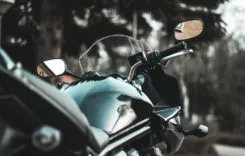Outlaw Chronicles: George Christie

Our sitdown with the former Hells Angels chapter president and mind behind Outlaw Chronicles: Hells Angels, George Christie.
Courtesy of History Channel

Carrying the Olympic torch in LA in 1984.
Courtesy of George Christie

Man and machine.
Courtesy of George Christie

In da club.
Courtesy of George Christie
I’ve been a History Channel addict (and history addict in general) since it was little more than old World War II footage glued together by a central theme in each show. Back then, we called it, “The Jolly Old Hitler Channel.” Fast forward almost thirty years and let’s just say the network has expanded into a lot of other areas since then. It’s far more diverse than it once was. The History Channel’s Outlaw Chronicles: Hells Angels is one of their more recent shows and, as shows about motorcycling go, one of the better programs in that particular subgenre in my opinion. That’s mostly due to former Hells Angel chapter president George Christie. His involvement with the show gives it some street cred and he isn’t the sort of guy to put up with a bunch of bullshit embellishment. Here’s what he had to say about the show and what he’s up to these days.
HB: Why’d you decide to do the show?
GC: When I was in prison in Texas, the producer from History reached out. At first I didn’t take it too seriously, but when they started going to the warden and counselors, I realized they were very sincere and wanted to talk to me. They wanted permission to film me as I walked out of prison but got the run around. That got put on hold. I didn’t get to start negotiating with them until July when I got back. I was on home detention for awhile. We reached an agreement in September and moved forward.
HB: How do you avoid getting into hot water with the people and events you talk about on the show?
GC: Let me put I to you this way. In 2011, I made the decision to leave the club. There were a lot of rumors about why I left. I insisted on the History Channel telling the story from an outlaw perspective. You’ll notice law enforcement plays second fiddle to me in the series and I take care not to give any information that’s going to lead to legal problems. One thing about giving this story from an outlaw perspective: one allegation is that these clubs are criminal organizations. All the major clubs are about riding bikes. There are individuals that have gotten into trouble in those organizations but you can go to Congress, medical associations, and find individuals there, too. If members get indicted they have to answer for that as individuals.
HB: What were the biggest turning points for the Hell’s Angels transforming from the club of the 60s and 70s into its current form?
GC: The biggest turning point was when law enforcement took special interest in the clubs and pursuing them as criminal organizations. The government wasn’t successful in the `79 Nor Cal case but law enforcement won’t let go of that. They really haven’t had much success convicting them but they’ve made careers, written books, and movies. I think that will continue, if not get worse.
HB: Is there anything you’d have done differently back in the day looking back now? If so, what and why?
GC: Hindsight’s always great but I think that any major event that happened I tried to learn from, bad or good, and apply that experience as a leader moving forward. I wish we’d never gotten into this conflict with the Mongols, but we did, and it continues to this day. I think law enforcement is our common enemy and engaging in these conflicts damages not just the clubs but motorcycle culture. There are a lot of outlaws out there that aren’t in clubs who’re impacted by the conflicts whether they want to be or not.
HB: What was your proudest moment as a Hells Angel?
GC: I think when we were accused in `84 of possibly supplying weapons to terrorists and we answered that by carrying the Olympic torch. I got to do that and it was one of our finest moments.
HB: How do you think the beef between the Hells Angels and the Mongols will end? Will it end?
GC: I’m no longer involved and I don’t think it’s appropriate for me to speculate but I hope it will end. I hope someone will take it upon themselves to resolve the problems. It’s really not for me to say. I hope they can someday agree to put diffs behind them. What’s interesting is, I went all over the world interacting with the clubs. I always found something that I had in common with them. It just seemed futile to fight with these guys. We were on the same wavelength. I think the problem is geographics and misunderstandings.
HB: What was the toughest call you ever had to make as a leader in the Hell’s Angels?
GC: That’s a really complex question. A lot of events took place. It was a constant decision making process. Getting all the major bike clubs to stop aggression toward each other was the biggest and most difficult decision and in the end it kind of unraveled. There was a time when they all got along and it was shaky. I remember being with all the clubs together in one place, getting along, and it was monumental. Ultimately, it melted away. I spent a year in a Texas prison and was cell mates with a Bandito and we got along fine. We all have a lot in common and it doesn’t make sense. If you can get along in prison, you should be able to get along on the street. If you can share your philosophies in a confined space over what an outlaw club should be, you should be able to do that outside too.
HB: What are you doing now?







